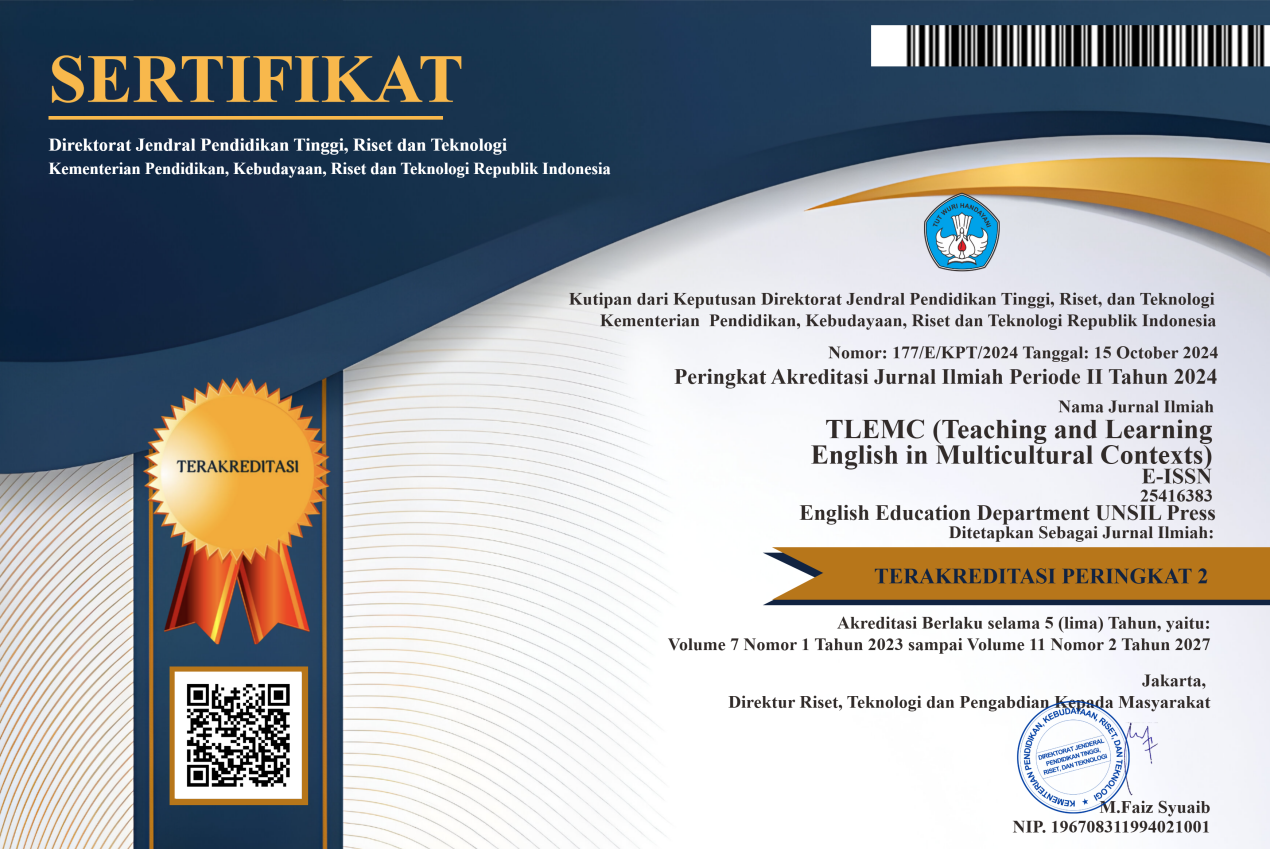Students' Self-Efficacy in Public Speaking: A Case Study in Indonesian EFL Context
Abstract
This study aims to investigate students’ self-efficacy in public speaking. This study involved four participants. The data collection method used is in the form of semi-structured interviews, then the data will be analyzed using thematic analysis. The research results are divided into four sources of self-efficacy from Bandura, namely Enactive Mastery Experience, Verbal Persuasion, Vicarious Experience, and Physiological and Affective States. This finding discusses the final level of students' confidence in their self-efficacy. Therefore, the results of this study provide empirical insight for students about self-efficacy beliefs of Enactive Mastery Experience (EME), Vicarious Experience (VE), Verbal Persuasion (VP), and Physiological and Affective State (PAS) and also provide information for teachers to optimize future learning, especially regarding self-efficacy.
Keywords: Self-Efficacy, Source Self-Efficacy, Public Speaking
Full Text:
PDFReferences
Aregu, Bekele Birhanie. (2013). “Self-Efficacy , Self-Esteem and Gender as Determinants of Performance in Speaking Tasks.†Journal of Media and Communication Studies 5(6):64–71. doi: 10.5897/JMCS2013.
Britner, Shari L., and Frank Pajares. (2006). “Sources of Science Self-Efficacy Beliefs of Middle School Students.†Journal of Research in Science Teaching 43(5):485–99. doi: 10.1002/tea.20131.
Frey, Kody, and Jessalyn Vallade. (2018). “Assessing Students’ Writing and Public Speaking Self-Efficacy in a Composition and Communication Course.†Journal of Communication Pedagogy 1(1):27–39. doi: 10.31446/jcp.2018.08.
Gerbino, Maria. (2020). “Selfâ€efficacy.†The Wiley Encyclopedia of Personality and Individual Differences (1994):387–91. doi: 10.1002/9781118970843.ch243.
Heslin, P., and U. Klehe. (2006). “How Self-Efficacy Affects Performance And Well-Being Self-Efficacy Nature of Self-Efficacy.†Organisational Psychology 2(January 2006):705–8.
Kurbanoglu, S. Serap. (2003). “Self-Efficacy: A Concept Closely Linked to Information Literacy and Lifelong Learning.†Journal of Documentation 59(6):635–46. doi: 10.1108/00220410310506295.
Njie, Baboucarr, and Soaib Asimiran. (2014). “Case Study as a Choice in Qualitative Methodology.†IOSR Journal of Research & Method in Education (IOSRJRME) 4(3):35–40. doi: 10.9790/7388-04313540.
Paradewari, Dirtya Sunyi. (1993). “Investigating Students’ Self-Efficacy Of Public Speaking Dirtya Sunyi Paradewari.†5(10):97–108.
Peterson, Tim O., and Royalyn B. Arnn. (2008). “Self-Efficacy: The Foundation of Human Performance.†Performance Improvement Quarterly 18(2):5–18. doi: 10.1111/j.1937-8327.2005.tb00330.x.
Sataloff, Robert T., Michael M. Johns, and Karen M. Kost. n.d. Usher, Ellen L., and Frank Pajares. (2008). “Sources of Self-Efficacy in School: Critical Review of the Literature and Future Directions.†Review of Educational Research 78(4):751–96. doi: 10.3102/0034654308321456.
Yang, Xin. (2017). “Sources of Chinese Learners’ Self-Efficacy in Learning English Pronunciation.†Theory and Practice in Language Studies 7(6):449. doi: 10.17507/tpls.0706.06.
Zhang, Xue, and Yuliya Ardasheva. (2019). “Sources of College EFL Learners’ Self-Efficacy in the English Public Speaking Domain.†English for Specific Purposes 53:47–59. doi: 10.1016/j.esp.2018.09.004.
DOI: https://doi.org/10.37058/tlemc.v6i2.5220
Refbacks
- There are currently no refbacks.
INDEXED BY:
This work is licensed under a Creative Commons Attribution-NonCommercial-ShareAlike 4.0 International License.
![]()
TLEMC (Teaching and Learning English in Multicultural Contexts)
Program Studi Pendidikan Bahasa Inggris
Fakultas Keguruan dan Ilmu Pendidikan
Universitas Siliwangi
Jl. Siliwangi No. 24 Kota Tasikmalaya - 46115
email: tlemc@unsil.ac.id





